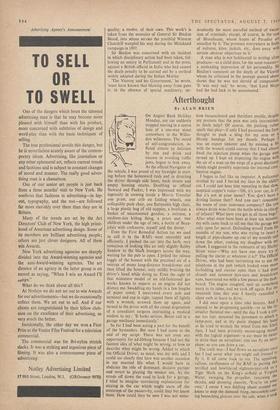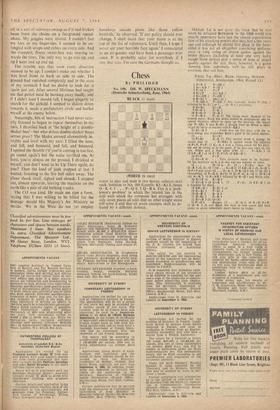Afterthought
By ALAN BRIEN
ON August Bank Holiday Monday, our car suddenly stopped moving in a centre lane of a one-way street somewhere in the Willes- den wilderness. The mood of self-congratulation, in- flated almost to delirium by sun and drink and success in avoiding traffic jams, began to leak away. As the official Navigator of the vehicle, I was proud of my foresight in start- ing before the homeward rush and in directing the driver through side lanes, back streets and empty housing estates. Doubling as official Steward and Packer, I was impressed with my ingenuity in stowing inside a Morris Traveller one pram, one crib on folding wheels, one collapsible push chair, one flattenable high chair, a large plastic bag of old nappies, a briefcase, a basket of unconsumed goodies, a suitcase, a medium-size kitbag thing, a pram seat, two children under the age of two, a bottle of Beau- jolais with corkscrew, myself and the driver.
Even the First Remedial Action (as we used to call it in the RAF) went smoothly and efficiently. I pushed the car into the kerb, very conscious of looking like an only slightly flabby Sandow to the black loungers across the way, waiting for the pub to open. I jerked the release toggle of the bonnet with the practised air of a veteran of many long-distance breakdowns and then lifted the bonnet, only mildly bruising the driver's hand while doing so. Even the sight of that miniature model of an old-fashioned gas works known to experts as an engine did not dismay me. Swaddling my hands in a few lengths of paper towel, I unscrewed every nob and terminal and cap in sight, tapped them all lightly with a wrench, screwed them up again, and turned to the driver with all the casual dogmatism of a consultant surgeon instructing a medical student to say: 'It looks serious. Better call in a garage mechanic immediately.'
So far I had been acting a part for the benefit of the bystanders. But now I had come to the end of my script. There was not even any opportunity for ad-libbing because I had not the faintest idea of what might be wrong, or how to describe what might be wrong. Added to which the Official Driver, as usual, was my wife and I could see clearly that here was another occasion in my married life when I. would have to abdicate the role of. dominant, decisive partner and revert to playing the weaker sex. As she strode off down the road to look for a garage, I tried to imagine convincing explanations for staying in the car which might stave off the contempt of the passers-by, could they but know them. How could they be sure I was not some-
how incapacitated and therefore unable, despite
my protests that the pain was only intermittent, to fetch help? Of course, the pushing rather spoilt that ploy—if only I had possessed the fore' thought to pack a sling for my arm or a bloody bandage for my thumb. Perhaps I was an expert tinkerer and by miming a bit with the wrench could convey that I had almost fixed the injection pump when the garage Man turned up. I kept on inspecting the engine with the air, of a man on the verge of a great discover/ which might possibly supersede the internal coin' bustion engine.
I began to feel like an imposter. A policeman strolled by and I buried my face in the child's cot. I could just hear him repeating in that slovi, sceptical copper's voice—'Oh, it's your car, is it? But it's not in your name? You don't have 3 driving licence then? And you can't remember the name of your insurance company? Do You always drink wine from the bottle while in charge of infants? What have you got in all those bags? After what must have been at least ten minutes, my wife came back to tell me that the garage Was only open for petrol. Defending myself from the assaults of my son, who was trying to insert length of pipe-cleaner up one of my nostrils and down the other, rocking my daughter with my elbow, I suggested in the remnants of my Bold Street voice—'Why not have one more try at, pulling the starter or whatever it is?' The Official Driver, who had been instructing me to use the., telephone in the pub (which looked even more forbidding and sinister open than it had done closed) and summon hire-cars and breakdoWn vans, humoured me with a few passes at the dash' board. The engine coughed, spat up something nasty in its tubes, and we took off again. For the twentieth time this year I hastily cancelled 3 silent oath to learn to drive. I did once upon a time take lessons. And I seemed to be progressing quickly—or so the in- structor flattered me—until the day I took a cor- ner too fast, mounted the pavement to attack 0, lamp-post, and in my panic slapped his hand as he tried to wrench the wheel from me. 1.nit,tt. then, I had been privately encouraging myself with the logical argument—a car must be easier to drive than an aeroplane; you can fly an ay.°. plane; so you can drive a car. The truth was—I had flown an aeroplane once but I had never what you might call learned to fly it. It all came back to me. The appalling, callous, carelessness of the RAF in putting this terrified and bewildered eighteen-year-old in a Tiger Moth on the King's airfield at Virginia Water, swinging the propeller, removing the chocks, and shouting cheerily, 'You're on your own.' I swear I was fiddling about around my knees to stop the damned thing. meanwhile cast: ing beseeching glances over the side, when it t0°' off in a sort of sideways swoop as if it had broken loose from the chains on a fairground round- about. My goggles were misted.- I couldn't feel my toes or my finger-tips. I seemed to be en- tangled with straps and cables on every side. And the cramped, flimsy sweat-box was moving to- wards the trees. The only way to go was up, and up I went and up and up.
- The trouble was that soon every direction seemed to be up. I couldn't make out whether 1 was level front to back or side to side. The ground had vanished completely and in the state of my .stomach I had no, desire to look for it again just yet. After several lifetimes had taught me that petrol must be burning away madly, and if I didn't land I should- tall, I began gingerly to search for the airfield. I seemed to Slalom down towards it, made a perfunctory circle and hurled myself at the enemy below.
Amazingly, bits of instruction I had never actu- ally listened to'began to repeat themselves in my ears. I throttled back at `the height of a double- decker bus'--but who drives double-decker buses across grass? The blades seemed alternatively in- visible and level with my ears. I lifted the nose, and fell, and bounced, and fell, and bounced.
I opened the throttle ('if you're coming in too fast, go round again') but the noise terrified me. At least, you're almost on the ground, I shrieked at myself, you don't want to be Up There again, do you? Then the load of junk stopped at last. I waited, listening to the fire bell miles away. The plane shook itself, sighed and shrank. I stepped out, almost upwards, leaving the machine on the earth like a pair of old bathing trunks.
The CO was kind. He made me sign a form, saying that I was willing to be billed for the damage should His Majesty's Air Ministry so decide. We in the West • do not yet employ kamikaze suicide pilots like those yellow bastards,' he observed. 'If our policy should ever change, I 'shall insist that your name is at the top of the list of volunteers. Until then, I hope I never see your horrible face again.' I remustered as an air-gunner and have been a passenger ever since, It is probably safer for everybody if I stay that way. I'm sure the Germans thought so.































 Previous page
Previous page